Linda Rodriguez's Blog, page 18
July 10, 2012
Literary Mystery Novelists--Joy Castro
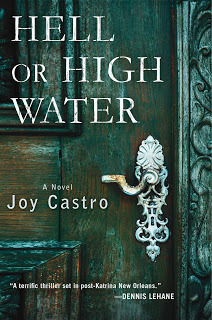 Joy Castro's new novel, Come Hell or High Water, qualifies her for both the Literary Mystery Novelists series and the Books of Interest by Writers of Color series on this blog. Castro's first book, The Truth Book: A Memoir, was lauded for its "achingly beautiful voice" by Robert Olen Butler and received critical acclaim. It is now used as a text in a number of memoir-writing classes around the country.
Joy Castro's new novel, Come Hell or High Water, qualifies her for both the Literary Mystery Novelists series and the Books of Interest by Writers of Color series on this blog. Castro's first book, The Truth Book: A Memoir, was lauded for its "achingly beautiful voice" by Robert Olen Butler and received critical acclaim. It is now used as a text in a number of memoir-writing classes around the country.Hell or High Water is a thriller set in post-Katrina New Orleans. Hundreds of registered sex offenders who went off the grid during the Hurricane Katrina evacuation have never been found.
The sex-offender story is assigned to Nola Céspedes, an ambitious young reporter at the Times-Picayune, who tries to balance her investigation with taking care of her aging mother, seeing her girlfriends, mentoring a teenager, and meeting a mysterious stranger named Bento.
As her research progresses, Nola is gradually drawn in to an underworld of violent predators--a world she struggles to keep separate from her middle-class professional life. Raised in poverty by a single mother in New Orleans' notorious Desire Projects, Nola has her own secrets to hide.
Here's the link to purchase Hell or High Water.
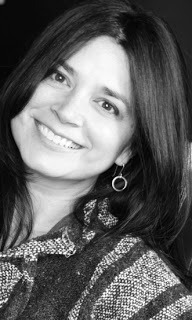
Bio
Joy Castro was born in Miami in 1967 and adopted four days later by a Cuban-American family of Jehovah’s Witnesses. She grew up believing in what Witnesses call “the Truth” and going door to door, but she ran away at fourteen when the home became abusive, finally leaving the religion at fifteen. On her own from the age of sixteen, she raised her son, born when she was a college junior, while finishing school and earning her graduate degrees. Raised to believe herself Latina, she found her birthmother at twenty-six and discovered that her actual ethnic background was quite different.
Castro’s first book, The Truth Book: A Memoir (2005), was named a Book Sense Notable Book by the American Booksellers Association, and was adaped and excerpted in the New York Times Magazine. In The Truth Book, Castro writes about religion, violence, adoption, ethnic identity, and her father’s suicide, as well as the warmth, beauty, humor, and passion for reading that sustained her.
Set in post-Katrina New Orleans, her debut novel, Hell or High Water, will be released by St. Martin's/Thomas Dunne in July. Her second memoir, Island of Bones, a collection of creative nonfiction and personal essays, is scheduled for publication in September by the University of Nebraska Press, along with a new paperback edition of The Truth Book with an introduction by Dorothy Allison.
Castro’s additional works include short fiction, poetry and creative nonfiction stories that have appeared in several anthologies and journals, including Cream City Review, North American Review, Quarterly West, Puerto del Sol, and Chelsea.
In 2007, she joined the faculty at the University of Nebraska-Lincoln, where she is currently an associate professor with a joint appointment in English and Ethnic Studies and serves as the associate director of the Institute of Ethnic Studies.
How would you describe Hell or High Waterfor the readers? What was your inspiration for this book?
Thank you, Linda! Hell or High Water is a literary thriller set in New Orleans in 2008, three years after Katrina. Nola Céspedes, an ambitious young reporter at the Times-Picayune, is assigned a story on the hundreds of sex offenders who went off the grid during the hurricane evacuation and were never relocated. At the same time, a young female tourist is abducted from the French Quarter, and Nola thinks the disappearance might be linked to her story. Her investigations take her into gritty territory.
My inspiration for the book was the beautiful city of New Orleans: its resilience, its courage, its complicated history. I tried to create a protagonist as tough, sexy, and gutsy as the city is. Hell or High Water is my love letter to New Orleans. Hell or High Water will come out in Germany from Deutscher Taschenbuch Verlag and in France from Gallimard, as part of their Série Noire. I think it's cool that it's going abroad.
What's your writing process? What is a typical writing day like for you? Do you keep to a set schedule? What are your writing habits?
When I’m writing the first draft, I write longhand in bed in the morning before I get up, before I talk to anyone or start thinking about my job. My brain is still full of dreams and music, and that’s the mental space I write from.
I write a chapter every day, rain or shine, even if it’s awful (and I work from an outline that I’ve hammered out in advance).
Once I’ve got a complete draft of the book, I type it up, which gives me a first opportunity to revise. (I work at a stand-up desk.)
Then I just keep revising and reworking until I’ve got something that’s ready to share. I don’t keep track of how many drafts I do during this stage; it would be too demoralizing. I focus on the work and not the counting.
After I get feedback from a few trusted readers and make any helpful changes they suggest, I revise again.
Finally, my last revision is a read-aloud marathon session, listening for sound, rhythm, and unintended repetition. I really care about the music of the lines.
Shortly after Hell or High Water debuts, the University of Nebraska Press will publish your second memoir, Island of Bones. What projects, literary or otherwise, are you planning next?
I’ve just finished the manuscript of the sequel to Hell or High Water, which also stars Nola Céspedes and is set in New Orleans. It will be out in 2013. We’re still playing with titles; I want BAD SHOOT, but my editor prefers NEARER HOME, which I suggested and do like; it’s an allusion to the Robert Frost poem “Desert Places.” We’ll see.
I’m editing an essay collection called Family Trouble: Memoirists on the Hazards and Rewards of Revealing Family, which is a really interesting project with essays by 25 different published memoirists. Publishing true stories about your family is a tricky thing, and these writers address the choices they made and the fallout they faced.
After that, who knows? I have a collection of short stories, HOW WINTER BEGAN, that would like to see the light of print, and there’s scholarly project about modernist writer Margery Latimer that’s been on the back burner for a while, so I might start that up again—or maybe there’s another Nola Céspedes novel in my future!
Who were your literary influences growing up? Are there any authors (living or dead) that you would name as influences?
When I was growing up, I loved mysteries of all kinds. I was addicted to Sherlock Holmes. I also loved the children’s novels of Frances Hodgson Burnett, especially A Little Princess. I love the way kindness triumphs in her work. I was also one of those girls-who-love-horses, so I read everything by Walter Farley and Marguerite Henry.
My literary influences generally are Jean Rhys and Katherine Mansfield, two modernist writers I love, and Milan Kundera. In terms of thrillers specifically, I’m most influenced by Dashiell Hammett, Dennis Lehane, and Kate Atkinson. I love hard-boiled voices, and the complexity and layers of Atkinson’s work blow me away.
Your first book was a critically acclaimed memoir, The Truth Book. What inspired you to write a novel? And why a thriller?
Well, one has only so much life to write about.
Mysteries and detective fiction have always appealed to me, and I thought, What if? So I tried it. It was a lot of fun.
I also think that mysteries are the genre of social justice. Social justice is something I’m passionate about—as is my protagonist. That passion gets both of us into trouble. She’s more mouthy than I am, though. And she carries a gun.
Do you belong to a critique group of other authors? Do you find it helpful? In what ways?
No. I was a part of a critique group for a while, and I loved it, but we were working at different paces on different kinds of projects. After a while, it sort of gently, organically fell apart.
I do share my manuscript with my agent, Mitchell Waters at Curtis Brown, who’s got a terrific ear and is ruthless, and with my husband, who’s a wonderfully literary reader and also infuriatingly logical, which is very helpful with plot. And then, of course, I’ve had really wonderful editors at St. Martin’s, Karyn Marcus and Margaret Sutherland Brown, who’ve helped my novels immensely at both the global and line-editing levels. So I guess they’re all sort of my critique group.
I have a scholarly Ph.D. in literature, so I’ve had some literary training, which helps. Teaching creative writing at the graduate level helps to keep my critical skills sharp.
What is your advice to aspiring writers? How important is it for a young writer to be a reader? What would you recommend they read?
Essential. Read voraciously. If you’re a young writer, I’d recommend that you read what you desire to read. You should let your own curiosity and tastes drive you. You’re developing your own voice and vision, so you should be led by what moves you. No matter how brilliant someone tells you a book is, if you’re bored, put it down. There’s no prescribed curriculum. I didn’t read Anna Karenina until I was in my forties, and the world did not end. Follow your passion.
What is the most surprising thing you’ve learned in your writing career? What has been the hardest part about being a writer?
The most surprising thing I’ve learned is that I can do it! I’ve wanted to be a writer since I was a small child. I’ve always written stories. Having them published and critically well received is a lifelong dream come true.
The hardest part has been trying to nurture a writing life while working full-time as a professor and raising a family. I alwaysfeel torn. But now that our son is finished with college and our foster daughter is about to go to college, I’m looking forward to more peace and space.
I love my job teaching at the university. Still, if something made it financially possible for me to quit, I’d quit tomorrow. It’s hard to wear too many hats. The kind of intelligence you need to navigate an academic community is not quite, shall we say, the same kind that you need to dream up an imagined world and dwell in that world for long periods of time.
The upshot, though, is that it can be done. If I can do it, anyone can do it.
Published on July 10, 2012 07:02
July 9, 2012
Forgotten Arts
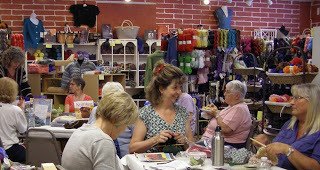
In my mystery novel, Every Last Secret, Skeet Bannion’s best friend owns a shop called Forgotten Arts, offering knitting, spinning, and weaving supplies. This shop is basically in the book because I love to knit, spin, and weave, and I’ve always had a little daydream of having just such a shop of my own.
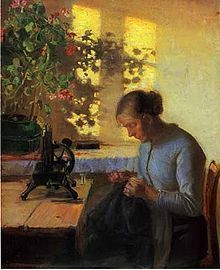 It probably all began with my grandmothers. One of them was an excellent needlewoman who taught me to sew doll clothes and doll quilts, using the scraps from her many sewing and quilting projects. This grandmother even made spring corsages for each granddaughter from old nylon stockings, cut up and dyed into violets, iris, lilies, and roses. The other grandmother knit and crocheted afghans, sweaters, even golf-club covers. Neither of them knew how to spin or weave, as far as I know.
It probably all began with my grandmothers. One of them was an excellent needlewoman who taught me to sew doll clothes and doll quilts, using the scraps from her many sewing and quilting projects. This grandmother even made spring corsages for each granddaughter from old nylon stockings, cut up and dyed into violets, iris, lilies, and roses. The other grandmother knit and crocheted afghans, sweaters, even golf-club covers. Neither of them knew how to spin or weave, as far as I know.Both of my grandmothers were great “makers from scratch,” though, whether with food, such as bread, butter, cheeses, and such, or with household items, such as baskets, candles, lotions, soaps, washcloths, and dish towels. My Cherokee grandmother even made her own medicines with herbs from her garden and weeds growing in the wild. Most of these medicines, foods, and household items were more effective or better-tasting than the mass-produced versions available in stores and pharmacies.
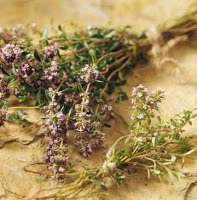
Beginning as a childhood apprentice to these two grand old dames, I set off on a lifelong quest for the forgotten arts. I have a huge library, and one of the categories within it is that of how-to books. I have books on how to design and make furniture from cast-off materials, how to make braided rugs, how to make doll houses and furniture, how to make canned foods and jellies, how to make your own purses and shoes, and books on yogurt making and felt making—and I have made all of these things and more. I seek out books on forgotten arts, such as spinning, weaving, smocking, rug hooking, tatting, and bobbin-lace making. (I’ve done the first three, but haven’t tried the last three yet.) I even have books on how to build your own log cabin or barn from scratch, how to milk a goat, and how to grow and use your own natural-dye garden. If all these dystopian books come true and we have some kind of societal collapse, I’m the neighbor you want to have.
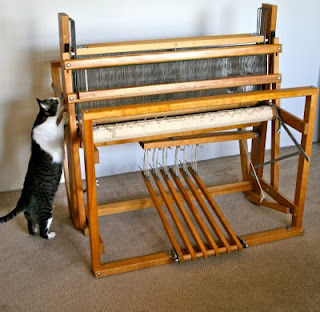 Of course, now that writing has taken over my life, my big floor loom in one end of the living room has become a cat gymnasium, my sewing machine sits permanently covered on a table where manuscripts have replaced fabric pieces, and gorgeous hand-knit projects languish neglected and unfinished in tote bags hanging from the doorknobs of my combination office and studio. I still believe these crafts have great value. I used to make time for them in a busy life, but I’ve lost that knack somewhere and need to recover it for a sense of balance. Meanwhile, I’ll write into my books a character who has that balance and that fibercraft store that I used to dream of owning.
Of course, now that writing has taken over my life, my big floor loom in one end of the living room has become a cat gymnasium, my sewing machine sits permanently covered on a table where manuscripts have replaced fabric pieces, and gorgeous hand-knit projects languish neglected and unfinished in tote bags hanging from the doorknobs of my combination office and studio. I still believe these crafts have great value. I used to make time for them in a busy life, but I’ve lost that knack somewhere and need to recover it for a sense of balance. Meanwhile, I’ll write into my books a character who has that balance and that fibercraft store that I used to dream of owning.In your own writing, what aspect of your life finds its way as a part of your story? Do you give a character some passion or aspect of your own personality? And when you’re reading, do you like to see these bits of the author’s personality embodied in the work?
Published on July 09, 2012 09:24
June 28, 2012
106 degrees and Counting Plus a Poem
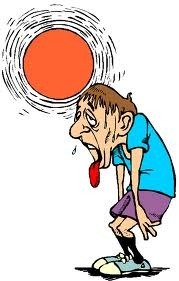 It's too hot to say anything, but coming up in future blogs are reviews of Heid Erdrich, Kathleen George, Paul Doiron, and Julia Spencer-Fleming, among others, and an interview with Joy Castro.
It's too hot to say anything, but coming up in future blogs are reviews of Heid Erdrich, Kathleen George, Paul Doiron, and Julia Spencer-Fleming, among others, and an interview with Joy Castro.Try to stay cool! And if you're anywhere near the wildfires in Arizona, Colorado, New Mexico, Texas, or on the Northern Cheyenne Rez, sending you blessings. Please stay safe!
A poem for these hot times.
BLAME IT ON SUMMER
that I smile too widely,grinning really, and laughtoo loud and often; that I walkwith spring and sensual sway;that I stretch myself and twistlike a catbaking in the backyardbrightness; that my brain is sun-bleached,all rule and thought boiled away, leavingonly sensory steam;that my feverish eyes see strange dancingflames in afternoon shadowsalong the sides of streets and Bedouin oases, fragrantwith dates and goats and acrid desert waters,in every suburban garden we passwhile you argue and driveand I stare, heavy-brained with heatand too aware of my own bodyand every other;that I take a lover,brazenly, crazily,too sun-stupid to be careful,in my dreams.
Published in Heart's Migration (Tia Chucha Press)
Published on June 28, 2012 19:46
June 23, 2012
Check me out elsewhere
Published on June 23, 2012 20:35
June 20, 2012
What Great Fun!--Peregrine Falcons, Germans from Russia, and Tourists at Readings
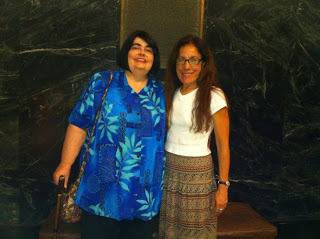 Amelia Montes and me
Amelia Montes and meI was invited to Lincoln, Nebraska, as a visiting writer by Amelia Montes, director of the Ethnic Studies Institute and professor of creative writing at the University of Nebraska-Lincoln. The visit was scheduled to begin with a dinner with faculty members and graduate students. Ben and I were late arriving because of unexpected road construction delays, so we parked at the hotel, checked in, and ran across the street to the restaurant with Amelia, who was patiently waiting for us.
Even with such an inauspicious beginning, the evening was a stimulating experience—brilliant company and conversation that ranged from crimes of passion in Mexico City to Russian Orthodox monasteries. Professors Joy Castro, James Garza, and Jennifer Garza, and Ph.D. candidate Bernice Olivas joined Amelia, Ben, and me for that very best kind of wide-ranging intellectual conversation that lasted late into the night.
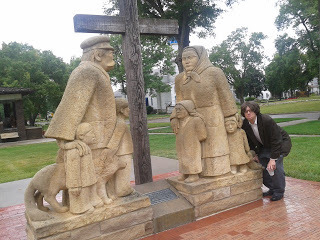 Ben at the Museum of Germans from RussiaThe next day, Saturday, was packed with activities. We woke early and were joined at breakfast by our dear friends, Allison and Travis Hedge Coke, who had driven two hours from the University of Nebraska-Kearney where Allison holds the Reynolds Chair of Creative Writing and coordinates the incredible Sandhill Crane Migration Literary Retreat and Festival. Travis was on his way to the airport, and Allison intended to join us for the day’s activities and my reading that evening. As always, it was so much fun to see them and talk with them, even if it was just for a short while with Travis.
Ben at the Museum of Germans from RussiaThe next day, Saturday, was packed with activities. We woke early and were joined at breakfast by our dear friends, Allison and Travis Hedge Coke, who had driven two hours from the University of Nebraska-Kearney where Allison holds the Reynolds Chair of Creative Writing and coordinates the incredible Sandhill Crane Migration Literary Retreat and Festival. Travis was on his way to the airport, and Allison intended to join us for the day’s activities and my reading that evening. As always, it was so much fun to see them and talk with them, even if it was just for a short while with Travis.Amelia arrived to interview me for a chapter in her book, Corazon y Tierra: Latinas Writing on the Midwest, Amelia’s critical book on contemporary writing by Latina authors who are writing either about or from the Midwest. I’m honored to be in this book, which is such a fascinating exploration of different kinds of Latina identity. Amelia’s questions were probing and perceptive, and she was massively prepared for the two-hour interview.
While Amelia interviewed me, Allison and Ben went exploring in Lincoln, visiting the Museum of Germans from Russia and the university campus, which has been beautifully landscaped with native plants, always a strong interest of Ben’s and mine.
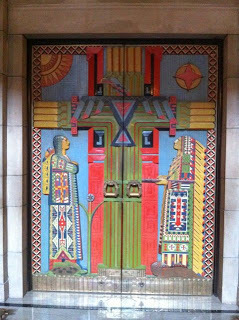 The old Senate chamber at Nebraska CapitolWe had lunch with a discussion of some of the initiatives both women were working on at their respective universities and the newest work of other writers with which we are all familiar. After lunch, Amelia had a special treat for us—a guided tour through the Nebraska State Capitol. It so happens Ben and I love to visit places like state capitols, but even those who don’t would have enjoyed this tour. Nebraska’s capitol building is a true original. All its components—from floors to ceiling—are pieces of art with symbolic meaning. Just wandering through it would be a delight because of the beauty, but the tour enhanced that with an understanding of the philosophical concepts behind everything. And our tour guide, Jameson, a student of history at the university, gave us such a dramatic rendering that it added to the pleasure.
The old Senate chamber at Nebraska CapitolWe had lunch with a discussion of some of the initiatives both women were working on at their respective universities and the newest work of other writers with which we are all familiar. After lunch, Amelia had a special treat for us—a guided tour through the Nebraska State Capitol. It so happens Ben and I love to visit places like state capitols, but even those who don’t would have enjoyed this tour. Nebraska’s capitol building is a true original. All its components—from floors to ceiling—are pieces of art with symbolic meaning. Just wandering through it would be a delight because of the beauty, but the tour enhanced that with an understanding of the philosophical concepts behind everything. And our tour guide, Jameson, a student of history at the university, gave us such a dramatic rendering that it added to the pleasure.The cap of our tour was a trip to the rotunda where a soldier’s poignant wedding was taking place. He and his best man were in uniform, and I’ve never seen such a starry-eyed groom. When the couple finished their vows to each other, the groom made his own vows to her three young children that left not only the kids wiping their eyes. We kept hoping he was not scheduled to leave for duty in Iraq or Afghanistan.
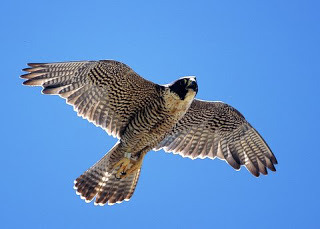 Breathtaking beauty in flightThe balcony section outside the rotunda offered an incredible view of the whole city. But even better, it offered… peregrine falcons! They nest on the top of the building, and during our whole time out there, the parents flew back and forth, bringing food to their constantly crying children. Of course, this was a great treat for me since I’m such a lover of raptors.
Breathtaking beauty in flightThe balcony section outside the rotunda offered an incredible view of the whole city. But even better, it offered… peregrine falcons! They nest on the top of the building, and during our whole time out there, the parents flew back and forth, bringing food to their constantly crying children. Of course, this was a great treat for me since I’m such a lover of raptors.As the tour ended, Amelia announced my reading that evening to the rest of the people in our tour group. This is exactly what I would have done in her place, so it’s interesting being on the other end and feeling embarrassed about the fuss. She was right to do it, though, and one lady said she intended to attend. After all of this, we went back to the hotel to rest and prepare for the reading and book signing.
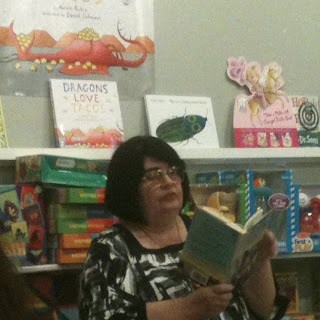 Reading from Every Last SecretI was excited about the bookstore where I would read. Indigo Bridge Bookstore is a bookstore, a coffee shop, and a nonprofit community development organization, all in one. This is quite unusual for a bookstore, and I was interested to see how well it worked. Located in the historic Hay Market district, Indigo Bridge Bookstore is cheerful and bright with plenty of customers, so I think it’s working quite well.
Reading from Every Last SecretI was excited about the bookstore where I would read. Indigo Bridge Bookstore is a bookstore, a coffee shop, and a nonprofit community development organization, all in one. This is quite unusual for a bookstore, and I was interested to see how well it worked. Located in the historic Hay Market district, Indigo Bridge Bookstore is cheerful and bright with plenty of customers, so I think it’s working quite well. Since some people had come for the mystery and some for the poetry, I mixed them in the reading, which worked well—I think because many of the same subjects and obsessions inform both areas of my work. I spoke about Every Last Secretand read from it briefly. Then I read a couple of poems from Heart’s Migration and a few more from my newest manuscript, Dark Sister. We had a lovely audience for the reading, including fellow writers Allison Hedge Coke and Joy Castro, students from the university, and townspeople. The woman from the Capitol tour showed up halfway through the reading, having wandered downtown Lincoln lost and missed the mystery part when that was what she came for, but she liked the poetry so much that she bought both books. It turns out she was a tourist from Iowa. And another woman of obvious maturity declared it was her very first reading, as she bought a book, and she thought she'd make them a regular thing from now on. So I felt I'd done my part for literature that night!
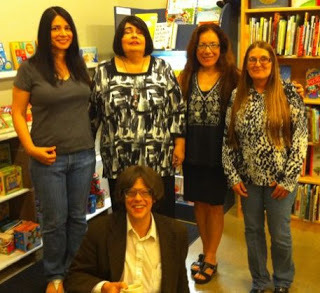 Joy Castro, me, Amelia Montes, Allison Hedge Coke, Ben
Joy Castro, me, Amelia Montes, Allison Hedge Coke, BenAfter the reading, we went out for a late meal and good conversation with other writers until midnight. So we wandered up to our hotel room, sleepy and happy.
The University of Nebraska has been wise to hire gifted writers, scholars, and teachers, such as Amelia Montes, Joy Castro, and Allison Hedge Coke. Somehow, after having seen the state's quirky but beautiful Capitol building, I'm not surprised.
In other news, I am a weekly blogger for the group blog Writers Who Kill on Saturdays, as most of you know. I have now also joined the group blog, The Stiletto Gang. (Ben said, "You'll have to use a knife for your photo since you can't wear heels.") I will be blogging there on the fourth Friday of each month. I hope you'll come visit me at both places.
I want to bring this blog back to twice a week, alternating between my two series, Books of Interest by Writers of Color and Literary Mystery Novelists, with occasional posts in the series, Balancing Writing and book Marketing, and posts about my own work. It will be a little bumpy for the next couple of weeks trying to get back to that, but then I think I'll be back in the groove. Thanks for stopping by!
Published on June 20, 2012 10:46
June 11, 2012
Books of Interest by Writers of Color—Red Weather by Janet McAdams
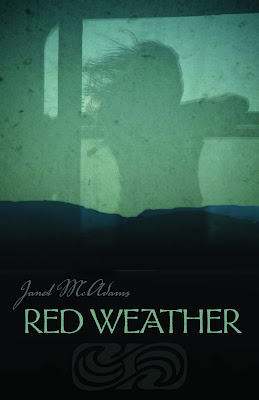 Click here to buy the book!
Click here to buy the book! Janet McAdams, Red Weather Sun Tracks: An American Indian Literary Series (University of Arizona Press) 192 pp., ISBN: 978-0-8165-2035-0
Janet McAdams’ suspenseful debut novel is a lyrical portrayal of a woman’s search for herself in the guise of her search for long-missing parents, who had fled imminent arrest for their involvement in a 1970s nonviolent Native American protest action that went wrong. Her protagonist, Neva, has lived in the South all her life, passing as white in fear of what might happen to her if those around her realize she’s part-Creek. Even her controlling, abusive husband never knew until the one person in whom she confided told him.
As her desperation to be free of this narcissistic husband and her loss of self grows, Neva discovers a clue to the possible whereabouts of her parents and flees her life in Atlanta to seek them in the tiny, war-torn country of Coatepeque in Central America. She finds work teaching the children of the wealthy elite, love with a sensitive man of shadowy connections, and friends for whom she can care and make a commitment. As the chaotic war around her escalates, Neva faces danger and heartbreak on all sides. Surrounded by violence and havoc, she begins to remake herself as a whole person.
Within Neva’s perspective, we move back and forth in time and space from her memories of her parents’ increasing commitment to activism as they learn of the heartrending forced sterilization of Native women in the United States to the constantly escalating battle the wealthy elite wage against the surrounding Indigenous populace in Coatepeque to memories of her husband’s selfishness and cruel domination, the personal version of these other large-scale attacks on Indigenous peoples. Her eloquent prose guides us through these transitions, and her beautifully rendered characters and places lure us on in this journey from grief and longing to the potential of a new life.
One of our most compelling and imaginative poets, McAdams weaves a spell of loss, forgiveness, and redemption that will grip the reader’s mind long after the last page is read.
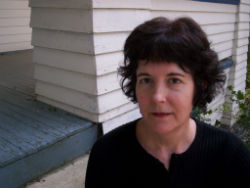 Janet McAdams Bio Janet McAdams is the author of two collections of poetry, Feral (Salt 2007) and The Island of Lost Luggage (Arizona, 2000), which won the Diane Decorah First Book Award from the Native Writers Circle of the Americas and the American Book Award. With Geary Hobson and Kathryn Walkiewicz, she is co-editor of the anthology, The People Who Stayed: Southeastern Indian Writing after Removal (Oklahoma, 2010).
Janet McAdams Bio Janet McAdams is the author of two collections of poetry, Feral (Salt 2007) and The Island of Lost Luggage (Arizona, 2000), which won the Diane Decorah First Book Award from the Native Writers Circle of the Americas and the American Book Award. With Geary Hobson and Kathryn Walkiewicz, she is co-editor of the anthology, The People Who Stayed: Southeastern Indian Writing after Removal (Oklahoma, 2010).In 2005, McAdams founded Salt Publishing's award-winning Earthworks book series, which focuses on indigenous poetry, and has since expanded to include contemporary Latin American poetry, translated and edited by Katherine Hedeen and Victor Rodriguez-Nunez. More about the series can be found at Salt Publishing.
Of mixed Scottish, Irish, and Creek ancestry, McAdams grew up in Alabama, has taught in Alabama, Central America, Georgia, Texas, Oklahoma, and the U.K. She now lives in Gambier, Ohio, and teaches at Kenyon College, where she is the Robert P. Hubbard Professor of Poetry.
Published on June 11, 2012 11:22
June 6, 2012
5 Tips On Social Media For Today’s Author—Guest Blog by Bryan Thomas Schmidt
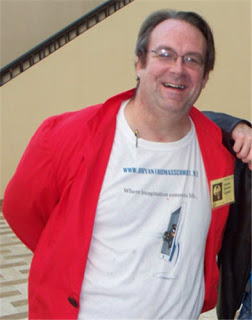 Please welcome Bryan Thomas Schmidt as a guest today. Bryan is a writer, a musician, and a professional at social media, so he's going to give us some valuable information on how to handle social media and book promotion while still writing our books.
Please welcome Bryan Thomas Schmidt as a guest today. Bryan is a writer, a musician, and a professional at social media, so he's going to give us some valuable information on how to handle social media and book promotion while still writing our books.Bryan Thomas SchmidtIf you’re an author today, chances are, social media has become a big part of the way you communicate with people. Modern authors often use it for communicating not just with fans but fellow authors, their editors, publishers and other professional contacts as well as family. In fact, many publishers and agents expect a commitment to social media from authors before they’ll offer a contract or as part of one. With the publishing industry in flux due to ebooks, downsizing of bookstores, the explosion of online sales, etc., more and more the marketing of books has come to fall upon the shoulders of the author.
For many, this can be very daunting. Artists by nature are often introverts. Authors, in particular, spend lots of time alone in a room with their computer, working. Social interaction is a distraction and drain they don’t seek. And certainly to do social media well, you have to learn how to come out of that shell. I’ve been building my online platform since 2009 and grown my author blog from 30 hits a month to over 3000 in that time. I’ve had success nationally marketing my novels and work through social media, and it has opened doors I never imagined. So Linda graciously asked me to share some tips with you.
First, social media is social. It’s not about you, it’s about the community. If you’re going to get involved, you must remember that above all else. The surest way to ruin your efforts is to be all about yourself. If your tweet stream is nothing but ads and links to your work, then you are going to chase people away. Your goal should be to build relationships, first, buyers second. People who like you and enjoy your conversations will, eventually, become interested in your work. That will lead to sales. While in the past, readers found a book, liked it, and then started contacting the author to get to know them, this is not how social media works. So you must approach it that way from the start or you’re very likely to fail before you begin.
Second, go with what’s comfortable. There are so many options it can be daunting. Experiment and find the ones you can get into and stick with those. You don’t have to be everywhere. It’d be impossible to keep up. For me, outside of my blog, I use Facebook and Twitter primarily. Google+ is there for me to distribute links from my Twitter and blog and that’s about it. With Twitter and Facebook, I get into comments and discussions a lot. I promote other people’s stuff as much as my own. I started a Twitter chat, in fact, called Science Fiction and Fantasy Writer’s Chat (hashtag #sffwrtcht) to promote others and regularly interview authors, editors and others live on Twitter, every Wednesday at 9 p.m. ET. This has opened up a huge name recognition and network of relationships which have definitely helped my career. Many people in the business know my name now who otherwise never would have, including some legendary authors I’ve admired for years.
Yes, it’s hard to talk about yourself for most of us, despite our egos. I get that. But once you get into the flow of a conversation, you can get over that. For example, there are ways to support each other without saying much.RT @rodriguez_linda: #FF these tweeps! @beatsbooknook @laurabenedict @lilithsaintcrow @richyanez @BryanThomasS @thebookmaven @BenoitLelievre @thrillerchick This is Linda’s Follow Friday (#FF) recommendations. When I RT (ReTweet) them to my followers, I help her and I don’t have to add a thing. Of course, I’m mentioned which is rather kind of her. But you get the idea.
Someone may post blog links, book links, or links to interesting other posts from blogs, news, etc. Perhaps it’s something you have thoughts on which you’d want to discuss. Pretty much anything is fair game but I’ll make two warnings: politics, religion and language are dangerous. Social Media is not private, no matter how low your follower count or what your security settings say. Twitter and Facebook both save copies of everything posted and reserve the right to post it how they wish. Past Twitter conversations can be found via Google Search, for example, so you never know who’s going to see it. I’d say avoid foul language to keep from alienating potential readers. Avoid religion and politics for the same. This is hard. We are passionate artistic people. We have strong opinions. We have strong emotions. But stories are legendary about people who have lost publishing contracts, sales, relationships, etc. over this stuff. Yes, freedom of speech is a constitutional right. But discretion and common sense are personal virtues, so use them.
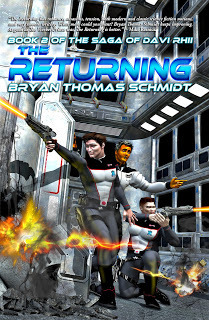 Third, use variety. I post about my novels, short stories, etc. The kinds of things I tweet are: daily writing goals and what I accomplish, upcoming events, key news, links to blog entries, reviews and books, humor, general thoughts about various things. Blog and buy links are limited to one or two a day. I post at 8-9 a.m. and 5-6 p.m. Those are the busiest times. That way I hit the night crowd. I try and let other people speak for my book rather than myself. For example:@BryanThomasS: Hours left to win a signed ARC of my 2nd novel. @Paulskemp: "A page-turning story that takes off like a rocket"
http://t.co/p2DiQd56
#scifiPaul Kemp is a bestselling author. People know him. His recommendation goes a lot further than me saying something like this:@BryanThomasS: Hey, my awesome new novel, THE RETURNING’s out for preorder, so you should buy a copy now here
http://t.co/p2DiQd56
Third, use variety. I post about my novels, short stories, etc. The kinds of things I tweet are: daily writing goals and what I accomplish, upcoming events, key news, links to blog entries, reviews and books, humor, general thoughts about various things. Blog and buy links are limited to one or two a day. I post at 8-9 a.m. and 5-6 p.m. Those are the busiest times. That way I hit the night crowd. I try and let other people speak for my book rather than myself. For example:@BryanThomasS: Hours left to win a signed ARC of my 2nd novel. @Paulskemp: "A page-turning story that takes off like a rocket"
http://t.co/p2DiQd56
#scifiPaul Kemp is a bestselling author. People know him. His recommendation goes a lot further than me saying something like this:@BryanThomasS: Hey, my awesome new novel, THE RETURNING’s out for preorder, so you should buy a copy now here
http://t.co/p2DiQd56
Of course I think my novel’s great. But I’m not exactly unbiased. Let others recommend it for you. Write a tweet that’s good enough, and people will retweet it to spread the word:RT @talekyn: RT @BryanThomasS: Hours left to win a signed ARC of my 2nd novel. @Paulskemp: "A page-turning story that takes off like a rocket" http://t.co/p2DiQd56 #scifiHearing it from other Tweeps (Twitter users) is much more influential than from you, at least until you’re a big name. So that’s why relationships and networking are so important.
For blog entries, interviews, and book links, my rule is twice a day. Other stuff can vary. I also try not to send more than three of these at a time so as not to drown people who follow.
Fourth, use hashtags. Hashtags are important. People follow @myname, yes, but they also follow hashtags. #scifi #fantasy #mystery #writing #mywana #amwriting #science #publishing #marketing are just a few. You can click any hashtag in a tweet and pull up a list of all tweets with that hashtag to follow along. It’s incredibly helpful. #sffwrtcht (my chat) wouldn’t work without it. By selecting appropriate hashtags, you are reaching out to interest groups which hopefully represent your audience of potential readers. So take the time to learn hashtags and use them.
Fifth, use shrinkers. Shrinkers are helpful because tweets have a 140 character limit. Shrinkers will take a tweet that’s too long, especially hyperlinks to websites, and shorten them so they’ll fit with everything you’re trying to say. I know it’s not proper grammar. Get over it. The fact that younger text-addicted generations haven’t learned that they have to talk differently in correspondence than texting doesn’t mean you’ll be the same. There are common shortcuts people use and there’s nothing wrong with that. It’s about conciseness as well as clarity. Syntax and etiquette for Twitter are a bit different than other mediums.
For example, say I want to tweet this: @BryanThomasS: My schedule for @conquestkc is going to be much fun. Check out the panels and other stuff http://bryanthomasschmidt.net/2012/05/17/my-schedule-for-conquest-43-may-25-27-2012-kansas-city-hilton/ and join us if you can. #scifi #fantasy #mywanaIt’s too long by 78 characters. But with a tweet shrinker, it might work like this:@BryanThomasS: My schdl 4 @conquestkc is gng 2 B mch fun. Chck out the panels & other stuff http://bit.ly/JlYhcN & jn us if U cn. #scifi #fantasy #mywanaLooks like nonsense? Not really, because as with copyedits and typos, your brain will fill in the gaps with the most logical missing letters to make sense of it. Once you’re used to it, it’s automatic and you can fit a lot more into 140 characters.
Well, this post is getting lengthy, and, as Linda will tell you, this is a subject about which I can go on and on. Perhaps she’ll have me on later for a discussion. I do post Write Tips every Monday, a popular series which you can find on my blog here: http://bryanthomasschmidt.net/category/write-tips-2/And I’d love to respond to comments and continue the discussion. I hope these tips are helpful. I’ll end with a brief bit about my latest novel and myself.
In Bryan’s second novel, The Returning, new challenges arise as Davi Rhii’s rival Bordox and his uncle, Xalivar, seek revenge for his actions in The Worker Prince, putting his life and those of his friends and family in constant danger. Meanwhile, politics as usual has the Borali Alliance split apart over questions of citizenship and freedom for the former slaves. Someone’s even killing them off. Davi’s involvement in the investigation turns his life upside down, including his relationship with his fiancée, Tela. The answers are not easy with his whole world at stake.
Bryan Thomas Schmidt is the author of the space opera novels The Worker Prince , a Barnes & Noble Book Clubs Year’s Best SF Releases of 2011 Honorable Mention, and The Returning , the collection The North Star Serial, Part 1, and has several short stories featured in anthologies and magazines. He edited the new anthology Space Battles: Full Throttle Space Tales #6 for Flying Pen Press, headlined by Mike Resnick. His children’s book 102 More Hilarious Dinosaur Jokes For Kids from Delabarre Publishing. As a freelance editor, he’s edited a novels and nonfiction. He’s also the host of Science Fiction and Fantasy Writer’s Chat every Wednesday at 9 pm EST on Twitter, where he interviews people like Mike Resnick, AC Crispin, Kevin J. Anderson and Kristine Kathryn Rusch. A frequent contributor to Adventures In SF Publishing, Grasping For The Wind and SFSignal, he can be found online as @BryanThomasS on Twitter or via his website. Bryan is an affiliate member of the SFWA.
Published on June 06, 2012 22:00
May 30, 2012
Literary Mystery Novelists—A List Part 2
As I’ve said before, I believe that we’re living in the second Golden Age of the crime novel. After mentioning this at literary parties recently and having writers ask me for crime fiction writers who write really well—in other words, being asked to prove my claim that many crime writers today are writing works of high quality that can hold their own against most literary novels published currently—I’ve posted the first half of a list of such gifted mystery writers. I’ve been running a series of interviews or profiles on these mystery writers whose work ranks with that of literary novelists, and I’ll continue it in the future. But now, I’ll post the second half of that list.
Because I’m a faulty human and haven’t read everyone and may not even remember everyone I have read, this will be nowhere near a complete list, but rather a starting place for people who want to explore the riches of the current crime novel scene. (And for writers I missed in the first half of the list, see the comments for that last post. I suspect there will be more who will show up in the comments on this post, as well.)
William Kent Krueger—his Cork O’Connor series is written with skill and depth
John Le Carré—ALL of his work—the death of the Cold War didn’t phase him, see The Constant Gardener for proof of that
Dennis Lehane—his Kenzie and Gennaro books are underappreciated in my opinion, but his standalones, such as Mystic River and The Given Day, deserve the attention they receive
John Lescroart—his Dismas Hardy/Abe Glitsky series is wonderful and any of his standalone books make a fine read
Laura Lippman—her Tess Monaghan series and her standalone novels are complex and riveting
Margaret Maron—her Judge Deborah Knott series is one of the best things around, start with The Bootlegger’s Daughter—she’s also reissued her Sigrid Harald series as e-books, as well as writing Three Day Town, which brings Sigrid and Deborah together in New York
Ngaio Marsh—she died in 1982, but her Roderick Alleyn series is still full of beautifully wrought books
Sharyn McCrumb—though she prefers not to be called a mystery writer any longer, her Elizabeth MacPherson series and her Ballad series are fine mysteries
Val McDermid—her Tony Hill series, on which the TV series Wire in the Blood was based, is a chilling exploration of the minds of psychopaths and those who try to outguess them
Walter Mosley—he’s one of our finest writers, and whether you read his Easy Rawlins series, his Leonid McGill series, or any of his many standalone novels, you will find excellent writing and consideration of serious issues in modern America
Marcia Muller—her Sharon McCone series was groundbreaking at its start in 1977 and continues to be critically acclaimed today
Katherine Hall Page—her Faith Fairchild series is written with great skill and warmth
Sara Paretsky—one of the great icons of the mystery community, her V.I. Warshawski series takes on all the important social and political issues of our time with impeccable writing and fascinating characters
George Pelecanos—his published work includes lots of A-list journals, as well as his eighteen crime novels—Stephen King once called him “perhaps the greatest living American crime writer"
Louise Penny—this Canadian author’s Gamache series set in the tiny town of Three Pines outside of Montreal is a feast for the lover of fine writing
Ann Perry—she has two Victorian mystery series that have both won critical acclaim, but her Thomas and Charlotte Pitt series is her finest, the longest sustained crime series by a living writer
Thomas Perry—a fine writer whose Jane Whitefield series is superb
Elizabeth Peters—ever since Crocodile on a Sandbank, Amelia Peabody has become one of those character who live on forever for generations of readers, a classic
Nancy Pickard—her Jenny Cain series and her Truth series used elegant prose to probe serious societal issues, but her most recent standalone novels are her finest with superb writing, characterization, and plotting—The Virgin of Small Plains is my favorite
Sandra Parshall—her Rachel Goddard mysteries are rich mélanges of character, place, and story complexity—Disturbing the Dead is a standout in a series of excellent novels
Ian Rankin—his Inspector Rebus series is the UK’s #1 bestseller and has spawned several TV series
Ruth Rendell—John Mortimer famously said, “If it weren't for a ridiculous literary snobbery about ‘crime writing,’ Ruth Rendell would be acclaimed as one of our most important novelists”
Hank Phillippi Ryan—her Charlotte McNally series showcases her gift for keeping the reader turning the page—I’m eagerly awaiting publication of her new standalone thriller, The Other Woman, in September
John Sandford—his Lucas Davenport series is dark and visceral
Julia Spencer-Fleming—her Clare Fergusson/Russ Van Alstyne series is one of the finest around—her supple prose, living and breathing characters, and treatment of many important cultural and societal issues make her one of our finest writers of any kind
Charles Todd—this American mother-and-son writing team have taken the British experience of World War II as their focus, and they bring it to life in their Ian Rutledge series and their Bess Crawford series
Jacqueline Winspear—her Maisie Dobbs series is another for the British World War I buff
Daniel Woodrell—his novels capture the misery and violence of the hardscrabble Ozarks backwoods—Winter’s Bone is my favorite among his many wonders
Published on May 30, 2012 20:32
May 24, 2012
Literary Mystery Novelists—A Requested List
We mystery readers are tremendously fortunate to be living in this time. I believe that we’re living in the second Golden Age of the crime novel, and I’ve been known to mention at literary gatherings that many crime fiction writers today are writing works of high quality that can hold their own against most literary novels published currently. Because of this, I’ve had several requests lately from people I know through the academic literary world for a list of such mystery writers. I’ve been running a series of interviews or profiles on these mystery writers whose work ranks with that of literary novelists, and I’ll continue it in the future. But right now, I’d like to furnish that list that has been requested so often.
As with any list such as this, it can’t be comprehensive. There are crime writers I’ve not read yet and some I’ve simply not even heard of yet. I discover new writers every day. There will inevitably be writers whose work I adore who will be left off because my mind blanked out as I typed this list. Because I am a faulty human, this will be nowhere near a complete list, but rather a starting place for people who want to explore the riches of the current crime novel scene. And the riches are such that I will have to split the list in two with the first half here today and the second half posting on Monday.
Enjoy!
Rudolfo Anaya--godfather of Chicano lit--his Sonny Baca series brings magic realism to the mystery novel
Lawrence Block—his Matthew Scudder novels, especially
Rhys Bowen—her Molly Murphy historical novels set in turn of the century New York—also, her delightful Her Royal Spyness series
Alafair Burke—James Lee’s daughter—the fruit doesn’t fall far from the tree
James Lee Burke—anything he’s written—one of the greats
Rebecca Cantrell—her Hannah Vogel series of historical novels set in pre-war Nazi Germany
John Connolly—his Charlie Parker series
Michael Connolly—his Harry Bosch novels
Lucha Corpi—her Gloria Damasco series and her new Brown Angel series
Robert Crais—his Elvis Cole/Joe Pike novels offer one of the great hero-pairings out there
Deborah Crombie—her Duncan Kincaid/Gemma James series—evokes England successfully despite living in Texas
Paul Doiron—his Mike Bowditch series—brings the forests of Maine to life for the reader
Hallie Ephron—her standalone thrillers, Never Tell a Lieand Come and Find Me—I’ve not read her co-written Dr. Peter Zak series
Tess Gerritsen—her Rizzoli and Isles series
Elizabeth George—her Inspector Thomas Lynley series—start with A Great Deliverance
Kathleen George—her Pittsburgh Homicide Division series
Sue Grafton—her Kinsey Milhone alphabet series
Jane Haddam—her Gregor Demarkian series
Carolyn Haines—her standalone thrillers, such as Penumbra and Touched—also her comic Bones series
Thomas Harris—the godfather of the serial killer thriller—Red Dragon and The Silence of the Lambs
Carl Hiaasen—heartbreakingly comic novels, such as Nature Girl and Flush
Patricia Highsmith—died in 1995, but her books are still some of the best psychological thrillers ever—Strangers on a Trainand The Talented Mr. Ripley have been made into films again and again
Tony Hillerman—died in 2008, but still one of the finest mystery novelists out there—begin with The Blessing Way and Dance Hall of the Dead
Declan Hughes—his Ed Loy series starts with The Wrong Kind of Blood
P.D. James—one of the greats—her Adam Dalgliesh series and her Cordelia Gray series both
J.A. Jance—she has three series—my favorites are the two series featuring J.P. Beaumont and Sheriff Joanna Brady
Craig Johnson—his Walt Longmire series about a Montana lawman has become a TV series
Published on May 24, 2012 14:50
May 22, 2012
How Best to Support Your Favorite Writers and Make Sure the Books You Love Keep Coming
This is a piece I posted to Writers Who Kill a couple of weeks ago. I'm reposting it here because I think it has important information that I didn't know until recently and that others have since told me they also didn't know. I'm also adding to this list "likes" and "tags" on Amazon and retweets about authors' books. Nancy Cohen reminded me about these. I think I'd missed them because I was already doing all those.
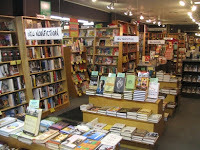 The publishing business still offers a steep learning curve to me. However, some of the things I’ve learned as a published novelist are turning me into a better fan of my own favorite authors. I’ve written on here before about pre-ordering and how I learned of its importance to writers. Instead of waiting for the books of my favorite author to be published, I pre-order now, knowing I’m contributing to their success as well as assuring I’ll have their book as soon as it’s available.
The publishing business still offers a steep learning curve to me. However, some of the things I’ve learned as a published novelist are turning me into a better fan of my own favorite authors. I’ve written on here before about pre-ordering and how I learned of its importance to writers. Instead of waiting for the books of my favorite author to be published, I pre-order now, knowing I’m contributing to their success as well as assuring I’ll have their book as soon as it’s available.
I thought I was already helping with reviews. On my blog, www.LindaRodriguezWrites.blogspot.com, I try to spotlight books by literary writers of color who might be hard for the average reader to find, as well as mystery novelists who are writing high-quality fiction. I do this with profiles, interviews, and sometimes reviews of individual books. However, I’ve learned that reviews on Amazon and Goodreads count more toward sales than those longer ones on my blog or elsewhere.
 I’ve always just given stars to books on Goodreads. I’ve read so many books that I didn’t think I had time for more than that. I was wrong. Those stars don’t do much good. It’s the reviews that make others decide to pick up the book to read. It’s the same with Amazon—reviews lead to sales. Even for authors who seem to have it made! Often even famous writers are just a breath or two away from tumbling down the slopes in the fickle game of publishing, and success is even more volatile for midlist authors. I try not to buy much on Amazon, so I’ve not done much except hit the ‘Like” button for a book/author I enjoy.
I’ve always just given stars to books on Goodreads. I’ve read so many books that I didn’t think I had time for more than that. I was wrong. Those stars don’t do much good. It’s the reviews that make others decide to pick up the book to read. It’s the same with Amazon—reviews lead to sales. Even for authors who seem to have it made! Often even famous writers are just a breath or two away from tumbling down the slopes in the fickle game of publishing, and success is even more volatile for midlist authors. I try not to buy much on Amazon, so I’ve not done much except hit the ‘Like” button for a book/author I enjoy.
I’ve learned about how important these reviews can be to authors, and now I’ve set myself a goal to post a daily review of a novelist whose work I enjoy on either Amazon or Goodreads. I’m also going to learn how to link them so a review on my blog will post to Amazon or Goodreads. This is one thing I can do to make sure the writers I love don’t disappear on me.
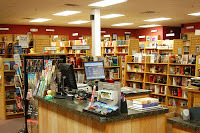 I’ve always been a person others ask for book recommendations, primarily because I read so much in so many areas. Now that I’ve learned how important that word-of-mouth advice on books can be, I’ll be doing a lot more book recommendations and not just waiting for folks to ask me. I have occasionally requested my library system buy a book I want that they don’t have. Now, as soon as I know a book is coming out by one of my favorite writers, I will request my library system order that book—and my own pre-orders for those books will be through local bookstores because that helps them decide whether or not to order in that book to have on the shelves.
I’ve always been a person others ask for book recommendations, primarily because I read so much in so many areas. Now that I’ve learned how important that word-of-mouth advice on books can be, I’ll be doing a lot more book recommendations and not just waiting for folks to ask me. I have occasionally requested my library system buy a book I want that they don’t have. Now, as soon as I know a book is coming out by one of my favorite writers, I will request my library system order that book—and my own pre-orders for those books will be through local bookstores because that helps them decide whether or not to order in that book to have on the shelves.
The publishing business is in deep flux right now, and authors are being required to do more than ever to promote their books. Every novelist I know, famous or unknown, is buried in a mountain of promotion efforts while still trying to write the books we fans love and wait for breathlessly. The influx of millions of ebooks by people who haven’t bothered to learn to be either good writers or good editors—and this is not meant to describe the many self-published writers who have worked hard at both—makes it hard for the potential buyer to find the writers who have worked for many years to hone their craft. Everything we, as fans of good writing in whatever genre, can do to make our favorite authors successful ensures that in the volatile atmosphere of publishing today these favorite novelists will survive and thrive—and continue providing us with our favorite addiction, their good books.
Do you know of other strategies we fans can do to help ensure the success of the book and authors we love?

 The publishing business still offers a steep learning curve to me. However, some of the things I’ve learned as a published novelist are turning me into a better fan of my own favorite authors. I’ve written on here before about pre-ordering and how I learned of its importance to writers. Instead of waiting for the books of my favorite author to be published, I pre-order now, knowing I’m contributing to their success as well as assuring I’ll have their book as soon as it’s available.
The publishing business still offers a steep learning curve to me. However, some of the things I’ve learned as a published novelist are turning me into a better fan of my own favorite authors. I’ve written on here before about pre-ordering and how I learned of its importance to writers. Instead of waiting for the books of my favorite author to be published, I pre-order now, knowing I’m contributing to their success as well as assuring I’ll have their book as soon as it’s available.I thought I was already helping with reviews. On my blog, www.LindaRodriguezWrites.blogspot.com, I try to spotlight books by literary writers of color who might be hard for the average reader to find, as well as mystery novelists who are writing high-quality fiction. I do this with profiles, interviews, and sometimes reviews of individual books. However, I’ve learned that reviews on Amazon and Goodreads count more toward sales than those longer ones on my blog or elsewhere.
 I’ve always just given stars to books on Goodreads. I’ve read so many books that I didn’t think I had time for more than that. I was wrong. Those stars don’t do much good. It’s the reviews that make others decide to pick up the book to read. It’s the same with Amazon—reviews lead to sales. Even for authors who seem to have it made! Often even famous writers are just a breath or two away from tumbling down the slopes in the fickle game of publishing, and success is even more volatile for midlist authors. I try not to buy much on Amazon, so I’ve not done much except hit the ‘Like” button for a book/author I enjoy.
I’ve always just given stars to books on Goodreads. I’ve read so many books that I didn’t think I had time for more than that. I was wrong. Those stars don’t do much good. It’s the reviews that make others decide to pick up the book to read. It’s the same with Amazon—reviews lead to sales. Even for authors who seem to have it made! Often even famous writers are just a breath or two away from tumbling down the slopes in the fickle game of publishing, and success is even more volatile for midlist authors. I try not to buy much on Amazon, so I’ve not done much except hit the ‘Like” button for a book/author I enjoy. I’ve learned about how important these reviews can be to authors, and now I’ve set myself a goal to post a daily review of a novelist whose work I enjoy on either Amazon or Goodreads. I’m also going to learn how to link them so a review on my blog will post to Amazon or Goodreads. This is one thing I can do to make sure the writers I love don’t disappear on me.
 I’ve always been a person others ask for book recommendations, primarily because I read so much in so many areas. Now that I’ve learned how important that word-of-mouth advice on books can be, I’ll be doing a lot more book recommendations and not just waiting for folks to ask me. I have occasionally requested my library system buy a book I want that they don’t have. Now, as soon as I know a book is coming out by one of my favorite writers, I will request my library system order that book—and my own pre-orders for those books will be through local bookstores because that helps them decide whether or not to order in that book to have on the shelves.
I’ve always been a person others ask for book recommendations, primarily because I read so much in so many areas. Now that I’ve learned how important that word-of-mouth advice on books can be, I’ll be doing a lot more book recommendations and not just waiting for folks to ask me. I have occasionally requested my library system buy a book I want that they don’t have. Now, as soon as I know a book is coming out by one of my favorite writers, I will request my library system order that book—and my own pre-orders for those books will be through local bookstores because that helps them decide whether or not to order in that book to have on the shelves.The publishing business is in deep flux right now, and authors are being required to do more than ever to promote their books. Every novelist I know, famous or unknown, is buried in a mountain of promotion efforts while still trying to write the books we fans love and wait for breathlessly. The influx of millions of ebooks by people who haven’t bothered to learn to be either good writers or good editors—and this is not meant to describe the many self-published writers who have worked hard at both—makes it hard for the potential buyer to find the writers who have worked for many years to hone their craft. Everything we, as fans of good writing in whatever genre, can do to make our favorite authors successful ensures that in the volatile atmosphere of publishing today these favorite novelists will survive and thrive—and continue providing us with our favorite addiction, their good books.
Do you know of other strategies we fans can do to help ensure the success of the book and authors we love?
Published on May 22, 2012 10:53



